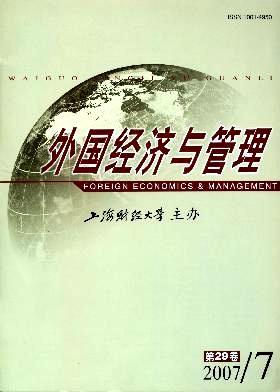人力资源管理实践与组织绩效关系研究的困境与中间变量选择
外国经济与管理 2007 年 第 29 卷第 07 期, 页码:35 - 43
摘要
参考文献
摘要
本文首先介绍了人力资源管理实践与组织绩效关系的研究现状,指出了该领域研究所存在的研究时效差异、因果律不确定、伪关系和影响模型不完善等问题;然后对人力资源管理与组织绩效之间中间变量的相关研究进行了简要综述,这些研究对解决人力资源管理实践与组织绩效关系研究中的现存问题,以及进一步的深入研究具有一定的指导意义。
[1]Rogers,WG,and Wright,P M.Measuring organizational performance in strategic human resource management:Problems,pros-pects and performance information markets[J].Human Resource Management Review,1998,(8):311-331.
[2]Philip Worsfold.HRM,performance,commit ment and service qualityin the hotel industry[J].International Journal of Contempora-ry Hospitality Management,1999,11(7):340-350.
[3]Patrick M Wright,et al.Thei mpact of HRpractices onthe performance of business unit[J].Human Resource Management Journal,2003,13(3):21-34.
[4]Mary,E G,and Lindsay,M T.The i mportance of the employee perspective in the competency development of human resource pro-fessionals[J].Human Resource Management,2006,45(3):337-355.
[5]Dyer,L,and Reeves,T.HRstrategies andfirmperformance:What do we knowand where do we needto go[J].International Jour-nal of Human Resource Management,1995,(6):656-670.
[6]Patrick M Wright,et al.The relationship between HR practices and firm performance:Examining causal order[J].Personnel Psy-chology,2005,28(2):409-417.
[7]Black,S E,and Lynch,L M.Howto compete:The i mpact of workplace practices and information technology on productivity[J].Reviewof Economics&Statistics,2001,83:434-445.
[8]Ichniowski,C,et al.The effects of human resource management practices on productivity[J].American Economic Review,1997,87:291-313.
[9]Delery,J E,and Doty,D H.Models of theorizingin strategic human resource management:Test of universalistic,contingency andconfigurational performance predictions[J].Academy of Management Journal,1996,39:802-835.
[10]Youndt,M A,and Snell,S A.Human resource management and firmperformance:Testing a contingency model of executive con-trols[J].Journal of Management,1995,21:711-737.
[11]Huselid,M A,and Becker,B E.The i mpact of high performance work systems,i mplementation effectiveness and alignment withstrategy on shareholder wealth[R].Working paper,Presented at the Annual Meeting of the Academy of Management,Boston,MA,1997.
[12]Watson Wyatt Worldwide.Human capital index:Human capital as aleadindicator of shareholder value[M].Washington DC:Wat-son Wyatt Publication,2002.
[13]Guest,D,et al.Astudy of human resource management and corporate performancein the UK[J].British Journal of Industrial Re-lations,2003,41:291-314.
[14]Ryan,A M,Schmidt,MJ,and Johnson,R.Attitudes and effectiveness:Examining relations at an organizational level[J].Person-nel Psychology,1996,49:853-882.
[15]Schneider,B,Hanger,P,Smith,B,and Salvaggio,A.Which comes first:Employee attitudes or organizational financial and mar-ket performance[J].Journal of Applied Psychology,2003,88:836-851.
[16]Koys,D.The effects of employee satisfaction,organizational citizenship behavior,and turnover on organizational effectiveness:Aunit-level,longitudinal study[J].Personnel Psychology,2001,54:1 101-1 114.
[17]Harter,J,Schmidt,F,and Hayes,T.Business-unit-level relationship between employee satisfaction,employee engagement,andbusiness outcomes:A meta-analysis[J].Journal of Applied Psychology,2002,87:268-279.
[18]Ful mer,B,Gerhart,B,and Scott,K.Are the 100 best better?An empirical investigation of the relationship between being a“greatplace to work”and firmperformance[J].Personnel Psychology,2003,56:965-993.
[19]Kanter,R M.The change masters:Innovation for productivityin the American corporation[M].New York:Si mon and Schuster,2002:56-59.
[20]United States Office of Personnel Management.Looking to the future:Human resources competencies[R].Acomprehensive studyof the federal human resources community,Sep.1999.
[2]Philip Worsfold.HRM,performance,commit ment and service qualityin the hotel industry[J].International Journal of Contempora-ry Hospitality Management,1999,11(7):340-350.
[3]Patrick M Wright,et al.Thei mpact of HRpractices onthe performance of business unit[J].Human Resource Management Journal,2003,13(3):21-34.
[4]Mary,E G,and Lindsay,M T.The i mportance of the employee perspective in the competency development of human resource pro-fessionals[J].Human Resource Management,2006,45(3):337-355.
[5]Dyer,L,and Reeves,T.HRstrategies andfirmperformance:What do we knowand where do we needto go[J].International Jour-nal of Human Resource Management,1995,(6):656-670.
[6]Patrick M Wright,et al.The relationship between HR practices and firm performance:Examining causal order[J].Personnel Psy-chology,2005,28(2):409-417.
[7]Black,S E,and Lynch,L M.Howto compete:The i mpact of workplace practices and information technology on productivity[J].Reviewof Economics&Statistics,2001,83:434-445.
[8]Ichniowski,C,et al.The effects of human resource management practices on productivity[J].American Economic Review,1997,87:291-313.
[9]Delery,J E,and Doty,D H.Models of theorizingin strategic human resource management:Test of universalistic,contingency andconfigurational performance predictions[J].Academy of Management Journal,1996,39:802-835.
[10]Youndt,M A,and Snell,S A.Human resource management and firmperformance:Testing a contingency model of executive con-trols[J].Journal of Management,1995,21:711-737.
[11]Huselid,M A,and Becker,B E.The i mpact of high performance work systems,i mplementation effectiveness and alignment withstrategy on shareholder wealth[R].Working paper,Presented at the Annual Meeting of the Academy of Management,Boston,MA,1997.
[12]Watson Wyatt Worldwide.Human capital index:Human capital as aleadindicator of shareholder value[M].Washington DC:Wat-son Wyatt Publication,2002.
[13]Guest,D,et al.Astudy of human resource management and corporate performancein the UK[J].British Journal of Industrial Re-lations,2003,41:291-314.
[14]Ryan,A M,Schmidt,MJ,and Johnson,R.Attitudes and effectiveness:Examining relations at an organizational level[J].Person-nel Psychology,1996,49:853-882.
[15]Schneider,B,Hanger,P,Smith,B,and Salvaggio,A.Which comes first:Employee attitudes or organizational financial and mar-ket performance[J].Journal of Applied Psychology,2003,88:836-851.
[16]Koys,D.The effects of employee satisfaction,organizational citizenship behavior,and turnover on organizational effectiveness:Aunit-level,longitudinal study[J].Personnel Psychology,2001,54:1 101-1 114.
[17]Harter,J,Schmidt,F,and Hayes,T.Business-unit-level relationship between employee satisfaction,employee engagement,andbusiness outcomes:A meta-analysis[J].Journal of Applied Psychology,2002,87:268-279.
[18]Ful mer,B,Gerhart,B,and Scott,K.Are the 100 best better?An empirical investigation of the relationship between being a“greatplace to work”and firmperformance[J].Personnel Psychology,2003,56:965-993.
[19]Kanter,R M.The change masters:Innovation for productivityin the American corporation[M].New York:Si mon and Schuster,2002:56-59.
[20]United States Office of Personnel Management.Looking to the future:Human resources competencies[R].Acomprehensive studyof the federal human resources community,Sep.1999.
引用本文
杜娟. 人力资源管理实践与组织绩效关系研究的困境与中间变量选择[J]. 外国经济与管理, 2007, 29(7): 35–43.
导出参考文献,格式为:
上一篇:国外组织责任行为研究模式评介
下一篇:国外人力资源审计发展现状及启示





 6779
6779  400
400

